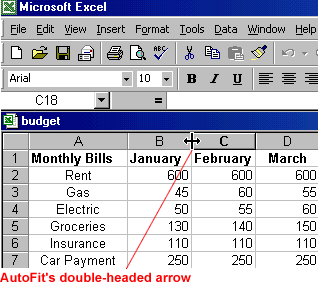Excel 2000
Adjusting Column Width and Row Height

Introduction
By the end of this lesson, you should be able to:
- Adjust column width and row height
Adjusting column widths
By default, Excel's columns are 8.43 characters wide, but each individual column can be enlarged to 240 characters wide.
If the data you are entering in your worksheet is wider or narrower than the default column width, you can adjust the width so it is wide enough to contain the data.
![]() You can adjust column width
manually
or use
AutoFit
.
You can adjust column width
manually
or use
AutoFit
.
Adjusting column width two ways
Manually:
- Place your mouse pointer to the right side of the column header.
- The mouse pointer changes to the adjustment tool (double-headed arrow).
- Drag the edge of the column header to the desired width and release the button.
AutoFit:
- Place your mouse pointer to the right side of the column header.
- The mouse pointer changes to the adjustment tool (double-headed arrow).
- Double-click the column header border.
- Excel autofits the column, making the entire column slightly larger than the largest entry.
![]() To access AutoFit from the menu bar, choose
Format
To access AutoFit from the menu bar, choose
Format
![]() Column
Column
![]() AutoFit Selection
.
AutoFit Selection
.

Adjusting row height
Adjusting row height is similar to adjusting column width.
To adjust row height:
- Place your mouse pointer on the lower edge of the row heading you want to adjust.
- The mouse pointer changes to the adjustment tool (double-headed arrow).
- Double-click to adjust the row height to autofit the font size.
- Drag to manually increase or decrease size.

Did you know?
When entering data into a worksheet, never leave blank columns between data-filled columns. Blank columns create major problems when performing advanced Excel functions such as making charts and sorting data.
Don't use columns to create space between your columns. Instead, adjust column width so your data is easy to read and understand.